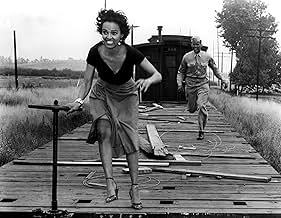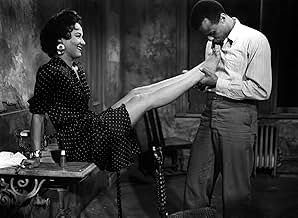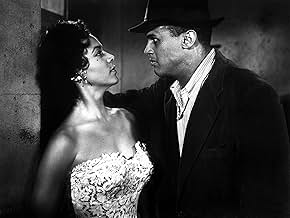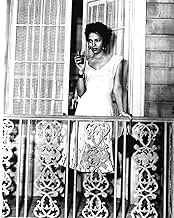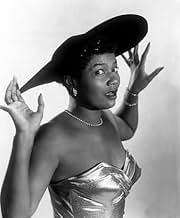IMDb-BEWERTUNG
6,8/10
6200
IHRE BEWERTUNG
Füge eine Handlung in deiner Sprache hinzuContemporary version of the Bizet opera, with new lyrics and an African-American cast.Contemporary version of the Bizet opera, with new lyrics and an African-American cast.Contemporary version of the Bizet opera, with new lyrics and an African-American cast.
- Regie
- Drehbuch
- Hauptbesetzung
- Für 2 Oscars nominiert
- 6 Gewinne & 8 Nominierungen insgesamt
Brock Peters
- Sergeant Brown
- (as Broc Peters)
LeVern Hutcherson
- Joe
- (Synchronisation)
- (as Le Vern Hutcherson)
Marilyn Horne
- Carmen Jones
- (Synchronisation)
- (as Marilynn Horne)
Marvin Hayes
- Husky Miller
- (Synchronisation)
Alvin Ailey
- Dance Soloist
- (Nicht genannt)
DeForest Covan
- Trainer
- (Nicht genannt)
Joseph E. Crawford
- Dink Franklin
- (Gesang)
- (Nicht genannt)
Carmen De Lavallade
- Dance Soloist
- (Nicht genannt)
Bernie Hamilton
- Reporter
- (Nicht genannt)
Margaret Lancaster
- Singing Voice
- (Nicht genannt)
Empfohlene Bewertungen
This memorable melodrama is an interesting adaptation of the classic "Carmen" story and music with a new setting and new song lyrics. Most of it works quite well, but it is remembered most of all for Dorothy Dandridge's impressive performance as "Carmen Jones".
The basic Carmen story itself is a perceptive and tragic look at the elemental passions and emotions that drive so much of what happens in human relationships. For the story to work most effectively, it takes a Carmen who not only has plenty of energy, but who also can be convincing in dominating all of the other characters. Dandridge excels at both, and she makes it easy to believe that she could get practically anything that she wanted from anyone.
Except for Pearl Bailey, who makes her character lively and entertaining in her own right, most of the rest of the cast is solid but is clearly - as is no doubt meant to be the case - overshadowed by Dandridge and Carmen. One exception, though, is Olga James as Cindy Lou. Although her character is very meek, and has no chance against Carmen, James does a fine job of making her sympathetic without becoming overly weepy or maudlin, and her performance adds some additional depth to the drama of relationships.
Most of the musical numbers work well, and there is good variety in them, as there is also in the settings and the material. The climactic sequence in the arena is nicely crafted, with the prizefight taking place in full view while, hidden from sight, the characters' passions are reaching the boiling point. It caps off an effective and interesting movie.
The basic Carmen story itself is a perceptive and tragic look at the elemental passions and emotions that drive so much of what happens in human relationships. For the story to work most effectively, it takes a Carmen who not only has plenty of energy, but who also can be convincing in dominating all of the other characters. Dandridge excels at both, and she makes it easy to believe that she could get practically anything that she wanted from anyone.
Except for Pearl Bailey, who makes her character lively and entertaining in her own right, most of the rest of the cast is solid but is clearly - as is no doubt meant to be the case - overshadowed by Dandridge and Carmen. One exception, though, is Olga James as Cindy Lou. Although her character is very meek, and has no chance against Carmen, James does a fine job of making her sympathetic without becoming overly weepy or maudlin, and her performance adds some additional depth to the drama of relationships.
Most of the musical numbers work well, and there is good variety in them, as there is also in the settings and the material. The climactic sequence in the arena is nicely crafted, with the prizefight taking place in full view while, hidden from sight, the characters' passions are reaching the boiling point. It caps off an effective and interesting movie.
Some greatness here. Dandridge's performance is riveting, and Pearl Bailey is a wonderful addition. Bizet's music is as appealing as always. The singers are excellent. The dancers at Billy Pastor's are another high point.
Too many slips for me to rate it a 10. It's lip-synced -- like every other movie musical, and (despite what one other reviewer said), one of the best lip-sync jobs I've seen. Only My Fair Lady does better (of those I've seen). Dandridge, Belafonte, and Bailey are particularly good; Olga James much less so. But I always find lip-syncing painfully obvious and distracting and will probably never have a chance to top-rate a movie musical as a result. It's also quite distracting when Joe breaks into song, because LeVern Hutcherson's voice is so different from Harry Belafonte's. It's a real shame that experienced singers like Dandridge and Belafonte weren't allowed to sing. Marilyn Horne, wow -- but I like the voice to match the face.
The acting is uneven. Some is excellent, led by Dandridge, and others do well too. But some of the acting is stiff.
Then there's the re-setting. Oh, moving the place is fine. It's funny that a couple of reviewers have referred to "how the Spaniards do it" and "Spanish opera". Hey, Carmen is set in Seville and Bizet attempted to use some Spanish musical idioms, but Carmen is a French opera through and through. Bizet was French, Prosper Merimee was French, the libretto is in French. But Carmen Jones only uses the top arias from Carmen, and ends up adding a lot of dialog to fill in the time. The story is true to the original, but Bizet told more in music and Hammerstein tells more in words. Oscar should have trusted Georges more.
I notice that Alvin Ailey is uncredited as a dancer. I found a couple of photos of him on the web -- it's hard, because his dance company has been so much more famous than the man, but I found a couple. I *think* I figured out which one he is -- some slo-mo work there -- but most of the dancers' faces don't come into focus for long enough to know for sure. It would be mostly a curiosity to know, since the movie doesn't show enough of the dance to see any personal style.
Too many slips for me to rate it a 10. It's lip-synced -- like every other movie musical, and (despite what one other reviewer said), one of the best lip-sync jobs I've seen. Only My Fair Lady does better (of those I've seen). Dandridge, Belafonte, and Bailey are particularly good; Olga James much less so. But I always find lip-syncing painfully obvious and distracting and will probably never have a chance to top-rate a movie musical as a result. It's also quite distracting when Joe breaks into song, because LeVern Hutcherson's voice is so different from Harry Belafonte's. It's a real shame that experienced singers like Dandridge and Belafonte weren't allowed to sing. Marilyn Horne, wow -- but I like the voice to match the face.
The acting is uneven. Some is excellent, led by Dandridge, and others do well too. But some of the acting is stiff.
Then there's the re-setting. Oh, moving the place is fine. It's funny that a couple of reviewers have referred to "how the Spaniards do it" and "Spanish opera". Hey, Carmen is set in Seville and Bizet attempted to use some Spanish musical idioms, but Carmen is a French opera through and through. Bizet was French, Prosper Merimee was French, the libretto is in French. But Carmen Jones only uses the top arias from Carmen, and ends up adding a lot of dialog to fill in the time. The story is true to the original, but Bizet told more in music and Hammerstein tells more in words. Oscar should have trusted Georges more.
I notice that Alvin Ailey is uncredited as a dancer. I found a couple of photos of him on the web -- it's hard, because his dance company has been so much more famous than the man, but I found a couple. I *think* I figured out which one he is -- some slo-mo work there -- but most of the dancers' faces don't come into focus for long enough to know for sure. It would be mostly a curiosity to know, since the movie doesn't show enough of the dance to see any personal style.
Preminger filmed this very quickly -- 17 days, I'm told -- in real or real-looking locations in the South, in widescreen. He cast top African-American talent and dubbed most of the cast, even those who could sing, to heighten the operatic effect.
Dandridge and Belafonte must be one of the most spectacularly beautiful couples in all the movies, and they play out the juicy old melodramatic plot for all it's worth (though his lack of acting training shows). The Hammerstein lyrics are mostly brilliant, and the original Merimee story is cleverly transplanted to a different time and place. The film's main trouble is its inconsistency of style -- it lurches from melodrama to comedy to musical comedy to opera, sometimes within a couple of scenes. The acting styles go from natural to hyper depending on what kind of scene is being played, so nothing really hangs together. In the better musicals, the moment where dialogue turns into song is subtly handled, so you're not really aware of the transition from realism to fantasy, but here there are huge bumps from one style to the next.
Still, it's good over-the-top entertainment, and, as noted elsewhere, a respite from the underuse and mishandling of African-American talent on the screen. And it is, for its time, low on condescension and stereotypes.
Dandridge and Belafonte must be one of the most spectacularly beautiful couples in all the movies, and they play out the juicy old melodramatic plot for all it's worth (though his lack of acting training shows). The Hammerstein lyrics are mostly brilliant, and the original Merimee story is cleverly transplanted to a different time and place. The film's main trouble is its inconsistency of style -- it lurches from melodrama to comedy to musical comedy to opera, sometimes within a couple of scenes. The acting styles go from natural to hyper depending on what kind of scene is being played, so nothing really hangs together. In the better musicals, the moment where dialogue turns into song is subtly handled, so you're not really aware of the transition from realism to fantasy, but here there are huge bumps from one style to the next.
Still, it's good over-the-top entertainment, and, as noted elsewhere, a respite from the underuse and mishandling of African-American talent on the screen. And it is, for its time, low on condescension and stereotypes.
Even after the success of Oklahoma, the partnership of Rodgers&Hammerstein was not cast in stone yet. After Oklahoma debuted, Oscar Hammerstein, II went to work on his next Broadway show with a dead collaborator. He wrote new lyrics for the music of Georges Bizet's opera Carmen and wrote a new book for an all black cast to perform it, in the tradition of Porgy and Bess.
That show was Carmen Jones and it ran for 502 performances on Broadway from 1943 to 1945. Hammerstein discovered what the team of Robert Wright and Chet Forrest had previously found out in adapting Edvard Grieg's melodies into their hit, Strange Music. That there's nothing like writing with a collaborator who can't complain and who's melodies are already a hit.
In fact while the show was originally on Broadway, Rise Stevens had sung in Going My Way the song that eventually became Dat's Love. And Nelson Eddy and sung The Toreador Song in his film Balalaika. Hammerstein brilliantly capitalized on some free publicity for his own show.
Harry Belafonte and Dorothy Dandridge give great acting performances though it's kind of strange to hear other voices coming from the mouths of two good singers. Their voices weren't operatic though, yet the singers dubbing them matched well with the personalities of both the leads. And Dandridge had Marilyn Horne, you can't do much better than that.
The whole thing originates from the French novelist's Prosper Merimee's story of the ill effects of passionate love. Harry Belefonte's on his way to being a Tuskegee airman and he runs afoul of Carmen Jones. Belefonte's got himself a gal, but Dandridge puts on her Delilah routine and Belefonte's dead meat.
In addition to Samson and Delilah the Belefonte character is remarkably similar to George Hurstwood in Theodore Dreiser's Sister Carrie. Another man who threw it all away for passion. I wouldn't be surprised if Dreiser refined Merimee's theme.
But Dandridge's performance is the best. As the hedonistic Carmen Jones, she's a wonder on screen. Seeing her realize that part on the screen, we can well understand why Belefonte threw it all away for love. Dandridge became the first black woman nominated in the Best Actress category, but she lost the Oscar sweepstakes to Grace Kelly for The Country Girl.
For those who like the opera Carmen, I think they'll be well pleased with Oscar Hammerstein, II did with Bizet's music and Merimee's story.
That show was Carmen Jones and it ran for 502 performances on Broadway from 1943 to 1945. Hammerstein discovered what the team of Robert Wright and Chet Forrest had previously found out in adapting Edvard Grieg's melodies into their hit, Strange Music. That there's nothing like writing with a collaborator who can't complain and who's melodies are already a hit.
In fact while the show was originally on Broadway, Rise Stevens had sung in Going My Way the song that eventually became Dat's Love. And Nelson Eddy and sung The Toreador Song in his film Balalaika. Hammerstein brilliantly capitalized on some free publicity for his own show.
Harry Belafonte and Dorothy Dandridge give great acting performances though it's kind of strange to hear other voices coming from the mouths of two good singers. Their voices weren't operatic though, yet the singers dubbing them matched well with the personalities of both the leads. And Dandridge had Marilyn Horne, you can't do much better than that.
The whole thing originates from the French novelist's Prosper Merimee's story of the ill effects of passionate love. Harry Belefonte's on his way to being a Tuskegee airman and he runs afoul of Carmen Jones. Belefonte's got himself a gal, but Dandridge puts on her Delilah routine and Belefonte's dead meat.
In addition to Samson and Delilah the Belefonte character is remarkably similar to George Hurstwood in Theodore Dreiser's Sister Carrie. Another man who threw it all away for passion. I wouldn't be surprised if Dreiser refined Merimee's theme.
But Dandridge's performance is the best. As the hedonistic Carmen Jones, she's a wonder on screen. Seeing her realize that part on the screen, we can well understand why Belefonte threw it all away for love. Dandridge became the first black woman nominated in the Best Actress category, but she lost the Oscar sweepstakes to Grace Kelly for The Country Girl.
For those who like the opera Carmen, I think they'll be well pleased with Oscar Hammerstein, II did with Bizet's music and Merimee's story.
to see this amazing film. I thought Halle Berry did a great job in the Dandridge biopic, but after seeing Carmen Jones I don't know if she could do Dorothy justice. This woman was amazing in this film. she RADIATED sex appeal and I could see why her performance was groundbreaking. Otto Preminger directed and shot a beautiful film, and contemporary actors, especially black actors, should set the performances in this movie as highwater marks to shoot for. Pearl Bailey was amazing in addition to the two leads, Belafonte and Dandridge. Joe Adams as the boxer and the woman who played Cindy Lou also gave great performance.
Again to see black actors in this time period given a chance to perform a full range of characters was really amazing. In a lot of ways this film is more progressive than the drivel of black genre films coming out of Hollywood today
Again to see black actors in this time period given a chance to perform a full range of characters was really amazing. In a lot of ways this film is more progressive than the drivel of black genre films coming out of Hollywood today
Wusstest du schon
- WissenswertesEartha Kitt was offered the role of Carmen, but the studio wanted her singing voice to be dubbed, so that her character would have an operatic voice. The same offer was made to Harry Belafonte and Diahann Carroll who accepted, but Kitt refused, wanting to use her natural voice. Dubbing was not required for Pearl Bailey, whose own voice suited her comedic songs.
- PatzerThe story takes place circa 1944, but all of the women's fashions and hairstyles are strictly 1954; when Carmen and Frankie are talking outside the Chicago Pawn Shop, 1950s-era automobiles passing by can clearly be seen reflected in the showcase window.
- Zitate
Carmen Jones: I always did want to see the big town.
Frankie: You got your wish, honey. Somethin' tells me Chicago's gonna be real good for you.
Myrt: Somethin' tells me you gonna be real *bad* for Chicago.
- Crazy CreditsThe opening credits and end title are set around a flaming rose.
- VerbindungenFeatured in Small Steps, Big Strides: The Black Experience in Hollywood (1998)
Top-Auswahl
Melde dich zum Bewerten an und greife auf die Watchlist für personalisierte Empfehlungen zu.
- How long is Carmen Jones?Powered by Alexa
Details
- Erscheinungsdatum
- Herkunftsland
- Sprache
- Auch bekannt als
- Oscar Hammerstein's Carmen Jones
- Drehorte
- Southern Pacific railroad crossing at 8746 E Los Angeles Avenue, aka California Highway 118, Moorpark, Kalifornien, USA(scene where Carmen attempts escape from the Jeep)
- Produktionsfirma
- Weitere beteiligte Unternehmen bei IMDbPro anzeigen
Box Office
- Budget
- 750.000 $ (geschätzt)
- Laufzeit1 Stunde 45 Minuten
- Farbe
- Seitenverhältnis
- 2.55 : 1
Zu dieser Seite beitragen
Bearbeitung vorschlagen oder fehlenden Inhalt hinzufügen




